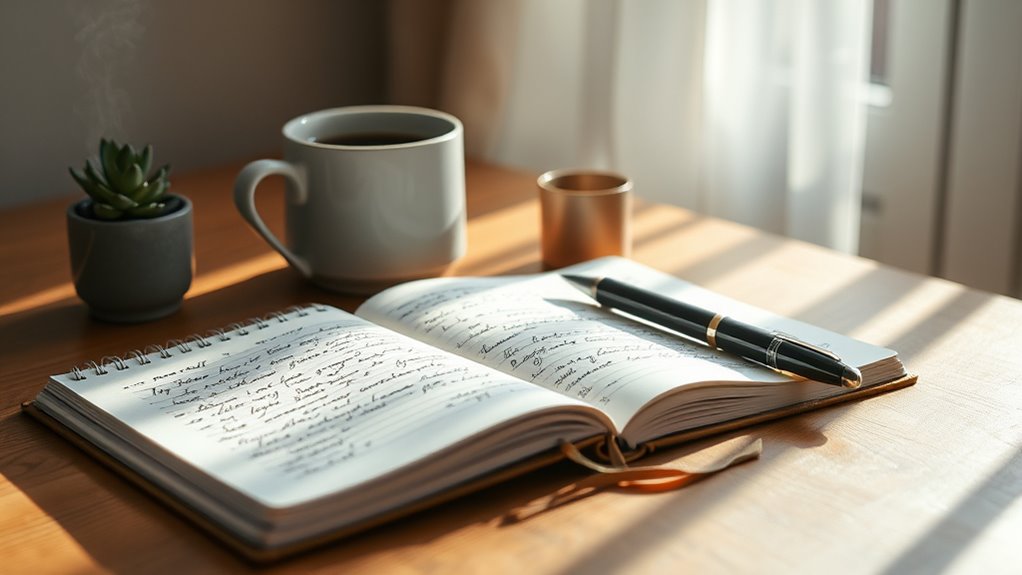Writing morning pages is an effective way to clear mental clutter and boost your creativity. By journaling honestly and freely, you access your inner voice, release stress, and gain mental clarity. This daily habit helps you prioritize goals, make better decisions, and start your day more focused and inspired. Incorporating this simple practice can transform your mindset and productivity—stick with it, and you’ll discover even more ways it benefits your mind and emotions.
Key Takeaways
- Morning pages facilitate honest, unfiltered writing, unlocking creativity and helping to access your inner voice.
- Regular journaling clears mental clutter, reduces anxiety, and enhances focus for daily tasks.
- Writing in the morning supports emotional release and self-awareness, improving mental well-being.
- The practice nurtures personal growth by breaking mental blocks and inspiring new ideas.
- Establishing a morning writing routine promotes mental clarity, decision-making, and overall productivity throughout the day.

Writing Morning Pages is a simple yet powerful habit that can transform your day. When you sit down each morning to write, you create a dedicated space for creative expression, allowing your thoughts and feelings to flow freely onto the page. This daily practice isn’t about producing perfect prose or fitting into a specific style; it’s about *accessing* your inner voice and giving yourself permission to explore ideas without judgment. As you put pen to paper, you’ll notice an increase in mental clarity, helping you start your day with a clearer mind and a sense of purpose. This clarity isn’t just about organizing your thoughts—it’s about clearing mental clutter, reducing anxiety, and gaining a fresh perspective on whatever challenges lie ahead.
By committing to Morning Pages, you give yourself the opportunity to process complex emotions and ideas that might otherwise stay trapped in your subconscious. Writing in this way fosters creative expression because it encourages you to be honest and unfiltered. Whether you’re venting frustrations, brainstorming new projects, or simply jotting down observations, you cultivate a habit that nurtures your creative mind. Over time, you’ll discover that this consistent act of writing helps break through mental blocks, inspiring new insights and solutions that weren’t apparent before. It becomes a safe space where your creativity can flourish without self-censorship, making it easier to carry that creative energy into other areas of your life.
Writing Morning Pages unlocks your creativity and helps break mental blocks for fresh insights and emotional clarity.
Moreover, Morning Pages serve as a mental decluttering tool. When you start your day by clearing your mind, you’re less likely to be overwhelmed by racing thoughts or distractions. Instead, you approach your tasks with a calmer, more focused attitude. This mental clarity enhances your decision-making, boosts productivity, and reduces stress. As you become more attuned to your inner dialogue, you’ll also gain a better understanding of your goals and values, aligning your actions with what truly matters to you. Writing regularly this way trains your brain to prioritize what’s essential and let go of mental noise that drains your energy. Additionally, positive affirmations within your writing can reinforce your confidence and motivation for the day ahead.
Ultimately, the act of writing Morning Pages isn’t just about jotting down thoughts—it’s about nurturing your mental and emotional well-being. It’s a daily ritual that supports your creative expression while sharpening your mental clarity. By making this practice a part of your routine, you set the stage for a more focused, inspired, and mindful day, all starting with a simple pen and a few quiet moments each morning.
Frequently Asked Questions
Can Morning Pages Replace Therapy or Counseling?
Morning pages aren’t a replacement for therapy or counseling because they mainly boost emotional processing and self-awareness. While journaling helps you understand your thoughts and feelings better, it doesn’t offer the professional guidance or support you get from a licensed therapist. If you’re dealing with deep-rooted issues, combining morning pages with therapy can be highly effective, but don’t rely solely on journaling for mental health treatment.
What Are the Best Tools or Notebooks for Morning Pages?
Using plain journals or digital notebooks is ideal for your morning pages. Many believe that simple, unlined notebooks help you focus without distractions, encouraging free flow of thoughts. Digital notebooks like Evernote or OneNote offer convenience and easy organization, while plain journals provide a tactile experience that can boost mindfulness. Ultimately, choose what feels most natural for you, as consistency matters more than the specific tool.
How Long Should Each Morning Pages Session Be?
Your writing session should last about 15 to 30 minutes, which usually results in 3 to 4 pages. Focus on your writing duration rather than a strict time limit, allowing your thoughts to flow freely. Shorter sessions might feel rushed, while longer ones can become overwhelming. Aim for a consistent session length that fits into your morning routine and helps you clear your mind effectively.
Is It Necessary to Write Every Morning Consistently?
Think of habit formation like tending a garden; watering daily helps it flourish. You don’t need to write every morning, but consistency benefits your mental clarity and progress. Skipping occasionally isn’t harmful, but regular practice makes it easier to clear your mind and develop discipline. If you stay committed, journaling becomes a natural part of your routine, just like watering your garden, nurturing clarity and focus over time.
Can Morning Pages Improve Mental Health Long-Term?
Yes, morning pages can improve your mental health long-term by fostering creative expression and providing emotional release. When you write freely each morning, you process feelings, reduce stress, and gain clarity. This consistent practice helps you build resilience, manage anxiety, and develop a deeper understanding of yourself. Over time, these benefits contribute to a healthier mindset, making it easier to handle life’s challenges with greater emotional balance and confidence.
Conclusion
By committing to morning pages, you clear your mind and unleash creativity. Many find that this daily habit reduces stress and boosts clarity, making it easier to face the day. The truth is, consistent journaling rewires your thinking, turning chaos into calm. So, embrace the practice with an open mind, and watch how your thoughts become clearer and your days more focused. Writing morning pages isn’t just a habit—it’s a powerful tool for a more centered you.









